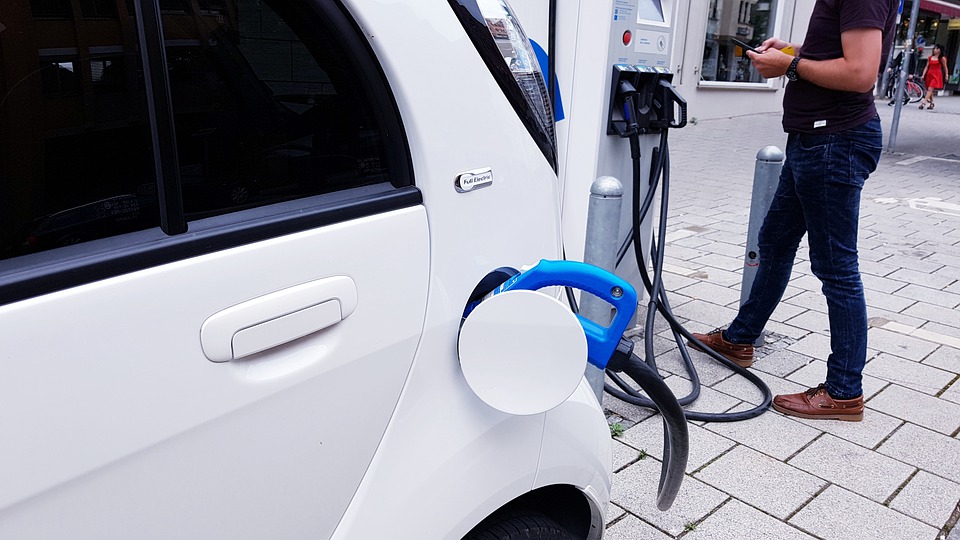State Is Far Behind on Electric Vehicles
And charging stations. Will federal funding provide enough of a boost?

Electric car charging station. (CC0 Public Domain)
Wisconsin is getting beat by most states in the growth of electric vehicles and charging stations. “We’re ten years behind some states in Wisconsin,” says Francisco Sayu, director of emerging technology for the nonprofit Renew Wisconsin, in an interview with Urban Milwaukee.
The big leader by far in electric vehicles (EVs) is California, which had nearly 39% of all EV registrations in the nation as of 2021, according to data from the Alternation Fuels Data Center. Wisconsin had less than 1% of the nation’s electric vehicles, exactly 0.64%, which left it behind 26 other states.
According to a report by the state Department of Transportation, Wisconsin has just over 9,000 electric vehicles (EVs), which is just 0.1% of all the state’s vehicles.
That’s projected to increase to 4% of all state vehicles by 2027 and 31% by 2050, but that will require a big increase in charging stations in the state.
“We’re 27th in charging stations, Sayu says: “We’re not leading. But we’re not the worst.” Nor are we leading in the Midwest, he adds. “Illinois and Michigan and Ohio are doing much better than us.”
Wisconsin is estimated to have about 400 charging stations, but only four of them are optimal, meaning fast-charging stations with four or more ports (handling four cars at a time) capable of delivering 150 kilowatts, Sayu notes. Fast charging stations can charge an EV from empty to 80% charged in 20-60 minutes, while Level 2 chargers take four to 10 hours and snails-pace Level 1 chargers can take up to 50 hours.
Why is the state’s slow progress on EVs important? For starters, electric vehicles generate less emissions, reducing pollution in the state. But EVs also mean more jobs and economic development for a state like Wisconsin, which produces almost no fossil fuels. “We pay $12 billion to $14 billion a year for petroleum products we import,” Sayu notes. “That’s money that goes out of state and we never see again. It’s a matter of economics and energy security.”
The good news is Wisconsin is about to make major strides, courtesy of the federal Bipartisan Infrastructure Law championed by President Joe Biden. The law includes $5 billion in funding to build support for electric vehicles, and Wisconsin will get nearly $79 million of that over a period of five years to pay 80% of the costs of new charging stations. The other 20% must come from private matching dollars by businesses that would operate them much like gas stations.
Under this plan, around 1,900 miles in the state would be covered by the network of charging stations, meaning 85% of all state highway miles in Wisconsin would be “within 25 miles of a fast charger,” as Kaleb Vander Wiele, WisDOT’s transportation electrification project manager, has estimated.
That’s a “tremendous increase” in charging stations, Sayu notes, and will give “confidence to the private sector” that this is a viable business, leading to more stations being built solely with private money.
One impediment to such growth is the state’s Republican-led Legislature, which has been unfriendly to renewable energy. Legislators passed a law requiring a $75 surcharge on auto registrations for gas-electric hybrid cars and a $100 fee for electric vehicles, arguing their owners pay less of a gas tax, which helps fund the maintenance and repair of state highways. Meanwhile legislators have resisted charging higher fees for big trucks, which cause most of the damage to roads.
Still, neither impediment is a major one, and Sayu expects great progress on EVs in Wisconsin as a result of the federal funding. “We still won’t be a leader,” he cautions. “We’re probably going to stay in the middle of the pack nationally.”
But even that position could mean much less pollution in Wisconsin and billions of dollars not being exported to fossil fuel states.
If you think stories like this are important, become a member of Urban Milwaukee and help support real, independent journalism. Plus you get some cool added benefits.
Murphy's Law
-
National Media Discovers Mayor Johnson
 Jul 16th, 2024 by Bruce Murphy
Jul 16th, 2024 by Bruce Murphy
-
Milwaukee Arts Groups in Big Trouble
 Jul 10th, 2024 by Bruce Murphy
Jul 10th, 2024 by Bruce Murphy
-
The Plague of Rising Health Care Costs
 Jul 8th, 2024 by Bruce Murphy
Jul 8th, 2024 by Bruce Murphy
Transportation
-
MCTS Adds 28 New Buses
 Jul 13th, 2024 by Graham Kilmer
Jul 13th, 2024 by Graham Kilmer
-
MCTS Designing New Bus Shelters
 Jul 10th, 2024 by Graham Kilmer
Jul 10th, 2024 by Graham Kilmer
-
MCTS Updates RNC Bus Detours To Better Serve Downtown, Riders
 Jul 9th, 2024 by Jeramey Jannene
Jul 9th, 2024 by Jeramey Jannene





















